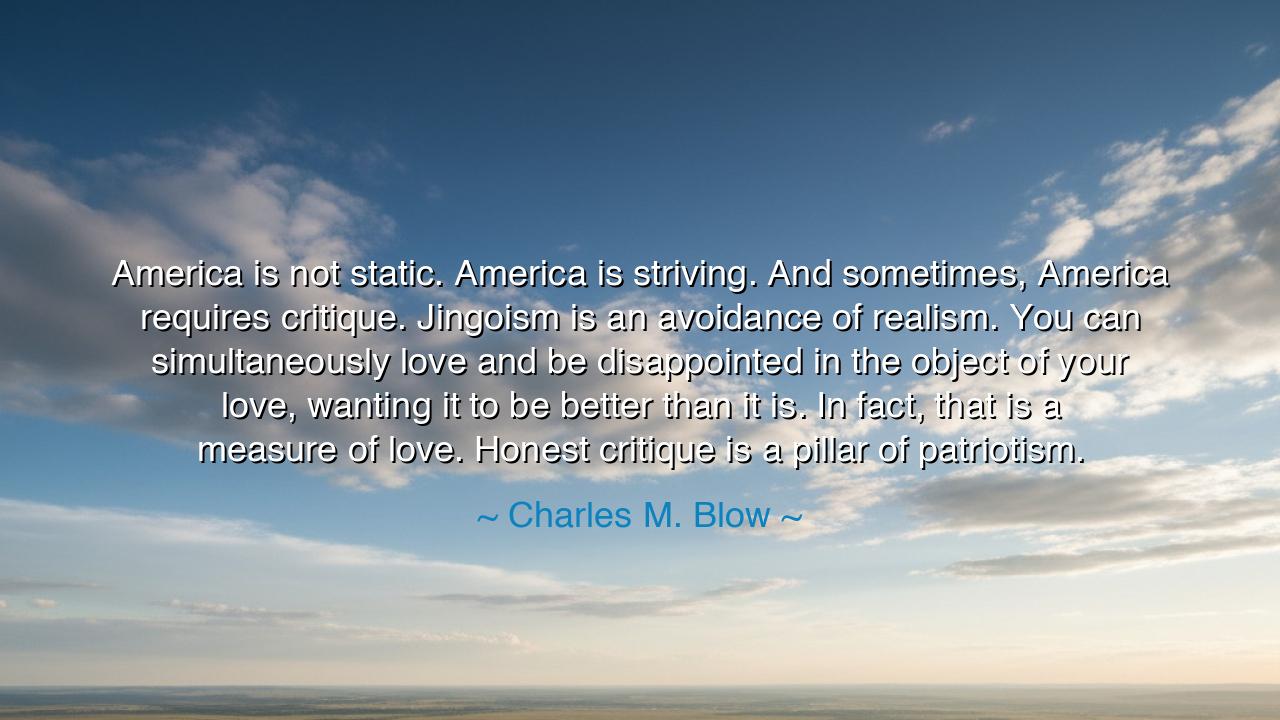
America is not static. America is striving. And sometimes
America is not static. America is striving. And sometimes, America requires critique. Jingoism is an avoidance of realism. You can simultaneously love and be disappointed in the object of your love, wanting it to be better than it is. In fact, that is a measure of love. Honest critique is a pillar of patriotism.






Hearken, children of the future, and attend to the profound wisdom of Charles M. Blow, who declares that America is not static, but a nation ever striving, ever in motion toward its higher ideals. In these words lies the truth that love of country is not passive; it is active, reflective, and demanding. To cherish a nation is not to ignore its flaws, but to perceive them with clarity, to confront its shortcomings, and to labor for its improvement. The highest measure of loyalty is not blind admiration, but the courage to see realism, to engage with truth, and to act toward the common good.
Blow’s insight arises from a long tradition of civic reflection, where thinkers and leaders recognized that critique is a sacred act of devotion. Across centuries, those who loved their homelands most deeply have been those willing to speak uncomfortable truths. To evade reality through jingoism—the shallow worship of national symbols or the unquestioning glorification of deeds—is to forsake the soul of the nation. True patriotism demands discernment: it embraces hope, acknowledges disappointment, and channels dissatisfaction into action that strengthens the foundations of the country.
Consider the historical example of Abraham Lincoln, whose leadership during the American Civil War embodies Blow’s principle. Lincoln loved the Union deeply, yet he confronted its divisions, its moral failings, and the grievous injustice of slavery. His devotion did not blind him to reality; rather, it compelled him to speak truth, to legislate, and to wage a just war to align the nation with its highest ideals. In Lincoln’s example, we see that honest critique, far from being unpatriotic, is the very pillar upon which a nation’s enduring integrity rests.
Blow further elucidates that one can simultaneously love and be disappointed in the object of one’s affection. This is the paradox of profound devotion: attachment does not preclude awareness of faults; indeed, it requires it. In loving one’s country, one must seek to elevate it, to nurture its strengths and correct its weaknesses. To shy away from critique, to mask flaws beneath fervent declarations of pride, is to betray the very ideals one professes to hold sacred. The courage to critique honestly is, therefore, the truest manifestation of loyalty.
In our modern age, this wisdom resonates profoundly. Citizens and leaders alike must recognize that the nation’s health is sustained not by applause, but by engagement, reflection, and the willingness to confront uncomfortable truths. From civil rights struggles to debates over governance, the voice of critique—grounded in knowledge, compassion, and courage—serves as a guiding light, illuminating the path from complacency to justice, from illusion to truth. Blow’s words remind us that patriotism is active, not passive, and requires both faith and vigilance.
From this reflection flows a practical lesson: embrace the responsibility of honest critique in service of the common good. Examine the policies, institutions, and practices of your nation with discernment. Speak truth, act to remedy injustice, and contribute to the public discourse with integrity. True patriotism is not the absence of disagreement, but the presence of conscientious engagement—a steadfast labor to align the nation with its loftiest ideals.
Moreover, cultivate communities that value reflection, dialogue, and accountability. Encourage others to engage critically, to recognize that critique stems not from disdain but from devotion. Foster understanding that a nation’s greatness is measured not by its unexamined triumphs, but by its capacity for self-correction, its openness to improvement, and its embrace of moral and civic responsibility.
Thus, children of tomorrow, inscribe upon your hearts this eternal truth: to love your country is to confront its imperfections, to speak boldly for justice, and to labor unceasingly for its betterment. Let your patriotism be measured not by blind celebration, but by courage, honesty, and action. In the pursuit of truth and improvement, you honor the enduring spirit of the nation, ensuring that it grows not only in might, but in virtue and wisdom, as Charles M. Blow so eloquently teaches.






AAdministratorAdministrator
Welcome, honored guests. Please leave a comment, we will respond soon